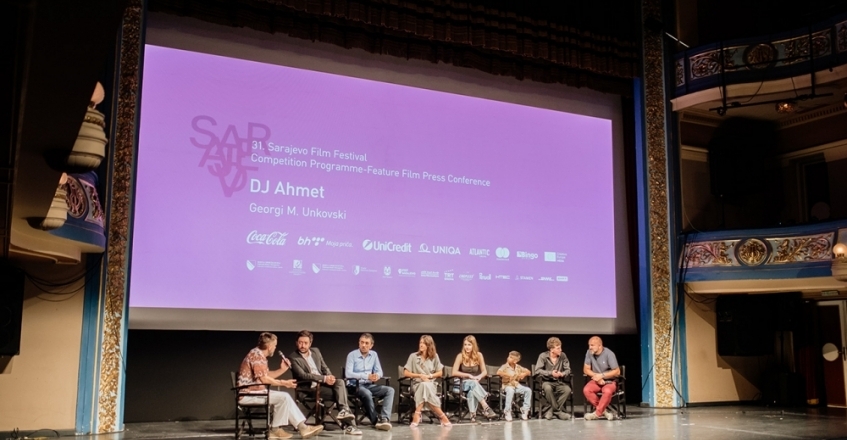News
Georgi M. Unkovski: I Had Image in My Head of a Shepherd Stumbling Into a Techno Party for a Long Time
In “DJ Ahmet” director Georgi M. Unkovski tells the story of a young boy from a rural village in North Macedonia who finds refuge in music while navigating his father’s expectations.
In “DJ Ahmet” director Georgi M. Unkovski tells the story of a young boy from a rural village in North Macedonia who finds refuge in music while navigating his father’s expectations.
What really inspired you to tell the story of a 15-year-old in a rural North Macedonian village who wants to become a DJ?
There are always many inspirations for a story, but I like to let them marinate for a while and see what sticks. I had this image in my head of a shepherd entering the forest and stumbling into a techno party for a long time, it’s something that stuck with me, mostly because I could see it happen here. Macedonia, and the region in general, is full of contrasts between tradition and modernity, and that image captured it perfectly. I remember scouting locations and seeing a shepherd pull out the newest iPhone. It was one of many small moments when I realized we had a film.
The film took about five years to make. How did the story change or evolve from your original idea to what we see in the final cut?
Naturally, there were many changes from the initial concept to the final version. With the help of our editor Michael Reich, we shaped what I originally imagined as a feeling and emotion into a complete film. I’m very open to changes, when they have a good reason, they should always be accepted. The goal is always to make the best film possible.
You auditioned over 3,000 kids and eventually cast Arif Jakup and Agush Agushev. What made them stand out for you as Ahmet and Naim?
We were very lucky with the casting. These kids are truly one in a million, and we found them all within a 50-kilometer radius of the village where we filmed. The chemistry between the two brothers carries the film. Everyone warned me that working with kids would be difficult, but they were absolute gems, hardworking and exceptional actors. It was a privilege to work with them. I’d also add that Arif is from the very village where we shot the film, which added to the authenticity. All of them brought a real vulnerability in front of the camera for the first time, and that’s a big part of why the film works.
The brothers’ bond is at the emotional heart of the film. How did you make that relationship feel so authentic on screen?
Casting did a lot of the work. The chemistry was there even before filming started. They were open, understanding, and worked together in a naturally brotherly way, despite not being related. On set, we created an environment that minimized stress for them, even though filmmaking can be intense. Keeping them outside of that pressure and letting them play within the scenes made their relationship stand out and feel extremely genuine.
The music blends electronic sounds with traditional elements and is a core part of the story. How did you choose Alen and Nenad Sinkauz as composers, and what was that creative process like?
From the start, I knew I wanted to make a modern village film that would stand apart from the traditional portrayals we’re used to in the Balkans. Alen and Nenad are amazing composers, and they achieved that by masterfully blending traditional rhythms with a modern sound. Combined with the hip hop and electronic music in the film, it created something fresh and contemporary that fits the story perfectly.
The film balances warmth, humor, and melancholy. How did you find and maintain that tone?
Mixing genres is one of my favorite parts of storytelling. Humor and tragedy are often intertwined in life; we find humor in sadness and sadness in humor. Life often gives us a wide range of emotions at the same time, and humor helps us deal with our lowest moments. That thin line between drama and comedy is where I want to make films, and it’s been present in my past work as well.
Filming in a rural North Macedonian village must have brought its own challenges and opportunities. What was that experience like?
It was unpredictable and a first for us. The collaboration with the villagers, their participation, and the culture they brought to the film added authenticity, color, and life. Shooting in the mountains, facing harsh weather, filming outdoors, working with animals, it pushed all of us to our limit, but it also led us to capture amazing shots and real authentic emotion. In the end, through struggle we get to those moments that are worth it on screen.
DJ Ahmet is premiering at the Sarajevo Film Festival, which is known for showcasing films that connect both locally and internationally. How do you hope the film resonates beyond North Macedonia and the Balkans?
I’m extremely happy and proud that the film is already resonating with audiences worldwide. It comes down to authenticity, the emotions are relatable whether you grew up in a village, a city, in the Balkans, or somewhere completely different. The universality of the story and the performances make it accessible to many cultures. The feedback has been amazing, and it’s a dream come true to make a film that connects so widely.






